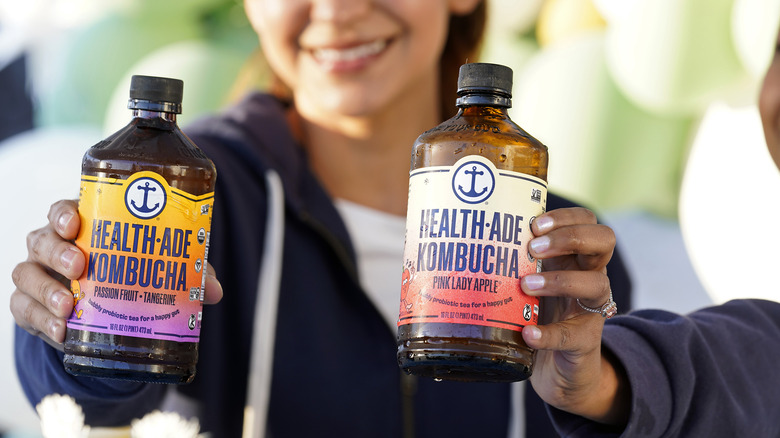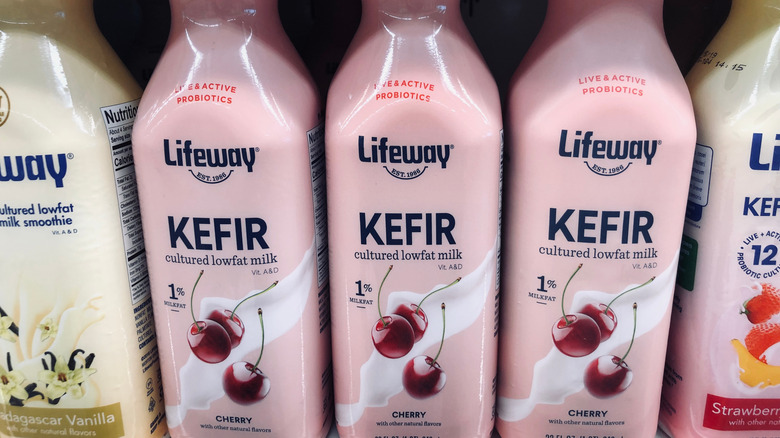The Water Alternative You Should Splash Into Smoothies (And It's Not Juice)
Smoothies are a delicious and easy way to up your fruit and veggie intake. Depending on which ingredients you use, these blended concoctions are typically a great source of fiber, protein, healthy fats, and other nutrients. But if you're looking to up the ante on your smoothie game to reap even more health benefits, we've got just the secret ingredient: kombucha.
Kombucha, a fermented tea beverage that contains probiotics, has been touted as being able to improve gut health because it introduces good bacteria into the body. The effervescent drink may also improve mental health, decrease gestational diabetes, and reduce eczema flares among other health benefits (via Nebraska Medicine).
While the average smoothie recipe usually doesn't call for kombucha, it's starting to gain prominence as more people become invested in improving their gut health. In fact, when Los Angeles-based upscale grocery chain Erewhon introduced its Olivia Rodrigo smoothie dubbed "good 4 ur GUTS" in December 2023, kombucha made its ingredient list. That said, kombucha is an excellent choice to add to your smoothie and may just be the secret elixir you need to help remedy a sour stomach.
How to add kombucha to a smoothie
Given kombucha's unique flavor profile and texture, you may be intimidated to add it to your smoothie. The beverage, while naturally sweet, is also acidic and tangy which could alter your smoothie's flavor and consistency. When it comes to picking out a kombucha flavor, think about which ingredients you plan to use. Many kombucha brands offer fruit flavors, so if you're craving a berry smoothie, you'll probably want to opt for a blueberry or strawberry-flavored kombucha.
If you're leaning toward a more tropical smoothie, you may want to consider a pineapple, passionfruit, or citrus-flavored kombucha. A green tea flavored kombucha would be a great addition to green smoothies. For more decadent smoothies that include ingredients like chocolate or peanut butter, the kombucha will likely be overpowered by the other ingredients, so you can use any flavor you like.
As for how much to add, we recommend using ⅓ to ¾ cup of kombucha, depending on if you're adding other liquids. But keep in mind that while kombucha can be a standalone base, the resulting product will likely be tarty and frothy. To help balance your smoothie's flavor and body, you can try adding equal parts kombucha and another base of your choosing like milk (or a milk alternative), yogurt, or water to round it out. Additionally, you could add sweeteners in like honey, agave, or maple syrup to further level out the taste. Adding more fruit can also help with taste and consistency.
Kefir can also be used in smoothies
If you're not a kombucha fan, don't fret. Kefir is another probiotic-rich beverage that your smoothie could benefit from. Unlike kombucha, kefir or fermented milk is only slightly tangy and not fizzy at all. In fact, it's thick and creamy which is perfect if you prefer a heavier consistency. Besides being a good source of protein, it's also packed with vitamins like calcium, phosphorus, magnesium, and vitamin D. And while there are dairy-free kefir options on the market, there is evidence suggesting that drinking traditional milk kefir can improve lactose digestion and tolerance in adults with lactose intolerance (per a 2003 study in the Journal of the American Dietetic Association).
As for how much kefir to add to your smoothie, 1 cup is standard in most recipes. Kefir can also act as a substitute for Greek yogurt or milk in your favorite smoothie recipe. If you're not sure what type of kefir to use, plain unsweetened kefir has a neutral base and should work well in most smoothies. However, if you're looking for some extra flavor (particularly in a fruit smoothie), you can try a flavored option like cherry, strawberry, or blueberry.



